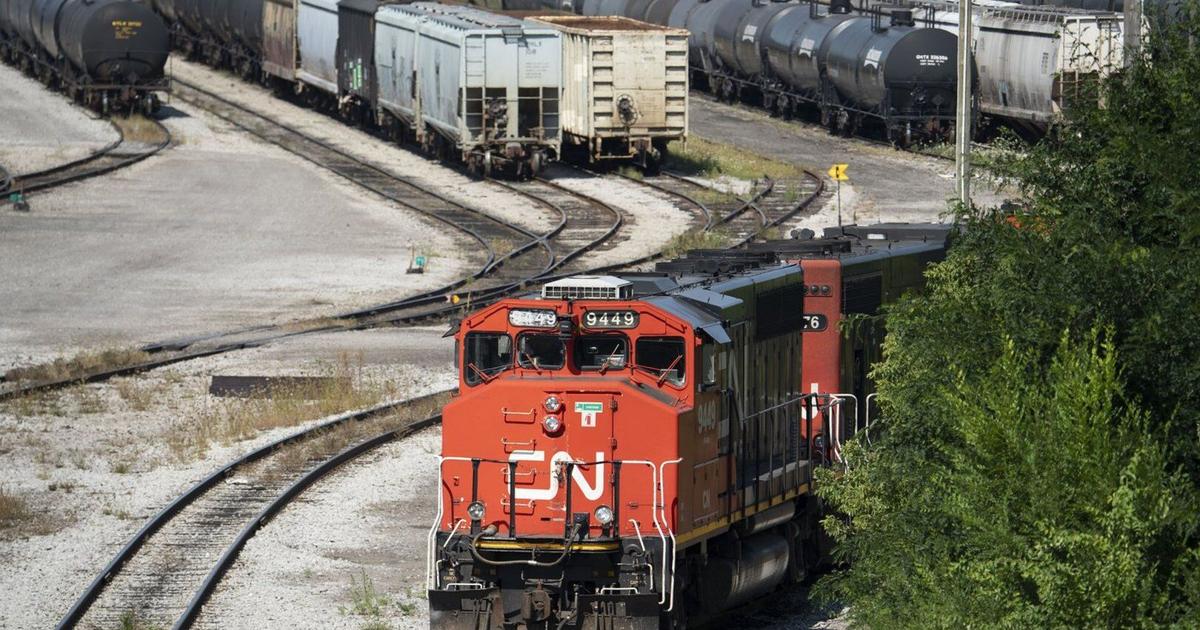MONTREAL – Canadian National Railway Co. on Friday spelled out cuts to its workforce and capital spending as it wrestles with plateauing freight volumes caused by the cross-border trade war, even as it turned a tidy profit in its latest quarter.
The country’s largest railroad operator boosted net income five per cent year-over-year to $1.14 billion in the quarter ended Sept. 30. The increase stemmed partly from higher container shipments than in 2024, when a summer work stoppage shut down operations at both of Canada’s major railways.
In a bid to streamline the company, CN announced $75 million in annual savings tied to some 400 management layoffs. The Montreal-based company registered a third-quarter head count five per cent lower than in the same period last year, said chief executive Tracy Robinson.
As U.S. sectoral tariffs depress shipments in forest products, metals and auto parts and vehicles, CN also opted to lop off nearly $600 million in capital spending for 2026 compared with this year. The move would put its capital expenditures at about 15 per cent of revenue, among the lowest in the industry.
“With a strong foundation in place, we’ve delayed select projects to reflect a softer economy,” said chief operating officer Patrick Whitehead.
“In the tariff world these days, we’re feeling the impact of that in certain areas like forest products, a little bit in steel and energy,” Robinson told analysts on a conference call.
With trade to the U.S. wobbling, she stressed the uptick in traffic between Canada and the United Kingdom, Europe and Asia, noting CN’s extensive port access.
But Robinson cautioned that prospects for growth in 2026 looked modest thanks to economic uncertainty.
“We see another year of limited volume growth with a weak outlook for North American industrial production and housing starts and some mixed headwinds, given the continued impact of tariffs — on forest products in particular,” she said.
Grain shipments dipped last quarter due to a late harvest, which is expected to hit record highs and boost volumes in the coming months.
To compensate for a sputtering economy, CN’s new chief commercial officer Janet Drysdale launched a “boots-on-the-ground sales program” to dig up new business and contracts, “no matter the size,” Robinson said.
The effort — begun after Drysdale was appointed earlier this month alongside the abrupt departure of chief field operating officer Derek Taylor — has generated roughly $130 million so far this year, the CEO said.
On top of trade barriers, another obstacle may be around the corner for Canadian railways. Union Pacific Corp., the second-largest railroad operator in the United States, announced in July it wants to buy Norfolk Southern Corp. in a US$85-billion deal that would create that country’s first transcontinental railway, and potentially trigger a final wave of rail mergers across North America.
Robinson criticized the potential acquisition, now being reviewed by U.S. regulators.
“The industry does not need a merger to provide better service to the North American economy,” she said. “We need less regulation, more competition.
“No level of mitigation can offset the reduction of options and the increased cost of service to customers.”
Should the deal go through, however, Robinson suggested CN would be open to a merger with another of the six big North American railways.
“We will, as we always do, entertain all options to create value for our shareholders,” she said.
On Friday, CN reported that revenue rose one per cent to $4.17 billion in the third quarter in line with overall freight gains and compared with $4.11 billion the year before.
On an adjusted basis, diluted earnings rose to $1.83 per share, topping last year’s $1.72 per share as well as analysts’ expectations of $1.77 per share, according to financial markets firm LSEG Data & Analytics.
This report by The Canadian Press was first published Oct. 31, 2025.
Companies in this story: (TSX:CNR)



